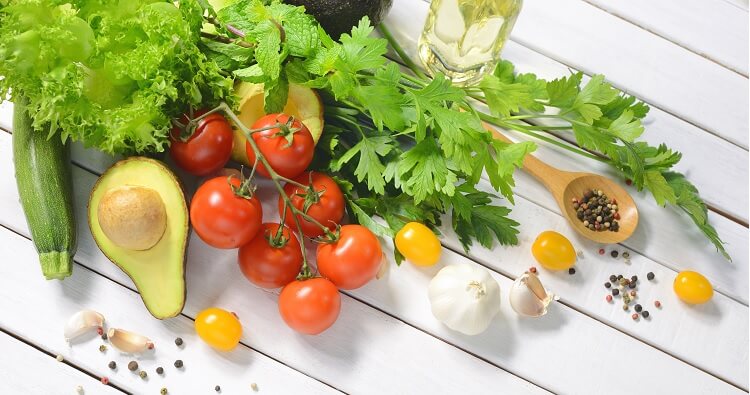Men who value their health are wise to pay attention to their heart health since heart disease is the number one killer of men in America. In 2017, the Centers for Disease Control and Prevention reported more than 340,000 men succumbed to heart disease – that’s about 1 in every 4 male deaths. The average age of a first heart attack in men is 65.6 years and approximately every 40 seconds, an American will have a stroke, according to the American Heart Association. The good news is following a heart healthy diet and lifestyle makes a tremendous difference in preventing this disease.
One of the biggest impacts a man can make towards heart health is his day-to-day food choices. The American Heart Association recommends choosing heart-healthy foods everyday, such as fruits, vegetables, whole grains and heart-healthy fats to reduce the risk of heart disease and stroke. The more high in fiber and antioxidants foods you consume, while low in sodium and unhealthy saturated fats, the better the benefits for keeping hearts healthy.
Below are 10 easy and effortless ideas of swapping out a few not-so-healthy foods for healthier, nutrient-dense options. Making healthy food swaps a natural part of a man’s eating habits, is a win-win for him and his heart.
- Swap butter for olive oil
Olive oil is rich in monounsaturated fat, also known as heart-healthy fat. It’s also loaded with antioxidants, including vitamin E and polyphenols protecting blood vessels and components of the heart. Butter, a saturated fat, contributes to the buildup of plaque along artery walls. Instead of adding butter to vegetables, mix olive oil with minced garlic and pepper to provide a one-two punch to meals. Or dip bread in olive oil and balsamic vinegar instead of butter.
- Swap fried fish for grilled salmon
When choosing fish, reel in fatty fish chock full of heart healthy omega-3 fatty acids. Omega-3 fatty acids have been shown to reduce risk of heart disease. Every week include two meals of fatty fish. The very best fatty fish sources of omega-3 fatty acids include anchovies, herring, mackerel, oysters, salmon, sardines, and tuna.
- Swap mayo for avocado
A fun and delicious way to include healthy mono-
- Swap chips for walnuts
Before opening a bag of salty, high-fat chips, think of heart health. Instead, swap the chips for walnuts. A handful of walnuts each day are a great way to boost intake of heart healthy omega-3 fatty acids and are a good source of protein, fiber and vitamin E.
- Swap red meat for chicken and fish
While small portions (4 ounces) of lean red meat can be used a couple of times a week, chicken and fish have less saturated fat. This type of fat can raise blood cholesterol increasing heart disease. Be sure to choose skinless chicken breast grilled or baked and fatty fish rich in omega-3s to boost heart health.
- Swap cold cereal for a bowl of warm oatmeal
A bowl of warm oatmeal is an ideal way to start each day. Oatmeal contains soluble fiber which has been shown to reduce cholesterol levels. The type of fiber in oatmeal, beta glucans, may be particularly beneficial for heart health and for weight control. This whole grain also contains the minerals magnesium and potassium also good for the heart.
- Swap white rice for an ancient grain
Certainly not as common as rice, ancient grains refer to types of whole grains that have remained relatively unchanged over thousands of years. These complex carbohydrates rich in fiber, protein, vitamins, and minerals, include ancient grains such as Teff, Amaranth, Millet, Quinoa, Bulgar, Buckwheat, and Farro. A Harvard study found that people who consumed whole grains each day as opposed to those who did not, had a 22% lower risk of dying from cardiovascular disease due to their high fiber content lowering cholesterol levels.
- Swap salt for spices
A delicious and sensible way to maintain heart health is to use more spices in cooking. Spices are rich in antioxidants and are potent inhibitors of tissue damage and inflammation that can contribute to heart disease. One example is garlic – it has a powerful compound called allicin which studies have shown lower risk of heart disease. Eating garlic regularly may also help with high cholesterol and high blood pressure. Even cocoa (yes, it is a spice) is chock-full of flavonoids which are antioxidants boosting heart health. Excess salt intake increases blood pressure as it holds excess fluid in the body, creating a burden on the heart. Keep sodium levels to no more than 2300 mg/day to reduce the risk of a stroke or heart attack.


